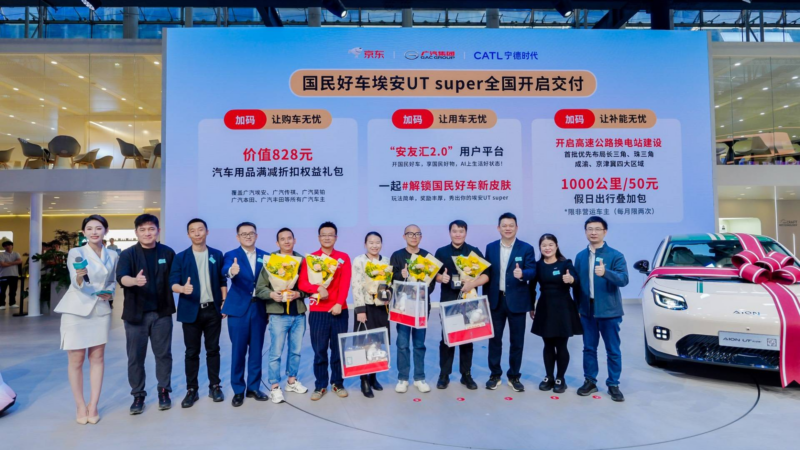JD.com’s Aion UT Super deliveries hit by refunds over undisclosed mileage limits in battery rental
The delivery of the Aion UT Super, sold exclusively on JD.com, has been met with a “refund storm” as multiple customers report discrepancies between promotional materials and the actual vehicle and service terms. Issues include a missing sunroof, undisclosed mileage limits for battery rental, and restrictive invoice policies affecting local subsidies.
One of the primary points of contention revolves around the vehicle’s hardware. Promotional images on JD.com’s platform depicted the Aion UT Super with a sunroof, a feature that customers like Ms Luo considered crucial. “I saw the sunroof in the promotional images when placing the order and quickly committed to catch the early bird discount,” Ms Luo stated to Beijing Business newspaper. She added that JD.com customer service had also explicitly confirmed the presence of a sunroof. However, customers later discovered the actual vehicle does not come with a sunroof, nor is it available as an option.
Upon inquiry, Beijing Business found that while JD.com’s Aion UT Super purchase link had removed the misleading images, similar promotional material still existed on the GAC Aion App. JD.com customer service acknowledged the discrepancy, stating, “Thank you for pointing it out. We have contacted GAC Aion for urgent modification.” All misleading images have since been removed from various purchase channels.
Adding to the confusion, information from offline dealerships was inconsistent. While a sales associate at GAC Aion’s Beijing Chaoyang Beilu experience centre confirmed the car has only one version without a sunroof, a customer from Hainan, Mr Wang Huan, reported being told by an Aion store employee that both sunroof and non-sunroof versions existed.
Ms Luo initially faced resistance from JD.com when seeking a refund, as the platform cited a “locked order, no refunds” policy. “The sunroof was a configuration I cared about personally, but more importantly, my trust in the seller was greatly diminished, fearing more issues later,” she explained. After a week of persistent communication and public outcry on social media, Ms Luo successfully secured her refund. JD.com later apologised, attributing the issue to “some channels displaying previous Aion UT model information that was not updated in time, leading some users to mistakenly believe it was Aion UT Super configuration information.”
Another major source of customer dissatisfaction stems from the battery rental service. The launch event heavily promoted a low monthly fee of 399 yuan ( 56 USD, for early birds, otherwise 499 yuan or 70 USD) for battery rental, but crucially omitted a 3,000 km monthly mileage limit. Customers like Jiajia from Jiangsu, who has a long daily commute, only learned about this restriction after placing an order and going for a test drive.
JD.com customer service confirmed the terms: a 3,000 km monthly limit, with an over-mileage charge of 0.2 yuan/km (0.028 USD/km). Unused mileage can be carried over to the next month, but not beyond. An Aion offline experience store staff member in Beijing suggested this limit was intended to deter the use of the Aion UT Super for ride-hailing services, noting that typical family cars rarely exceed 3,000 km per month.
JD.com further elaborated that the 3,000 km monthly standard (averaging 100 km per day) is based on statistical data for private vehicle monthly mileage, designed to cover over 90% of family users’ daily needs and form the basis for the “family package’s” cost-effectiveness. This distinction also aims to differentiate between private and commercial use, ensuring fair service and pricing for all family users. For those with longer travel needs, JD.com announced plans for a “mileage increment package” offering an additional 1,000 km for 50 yuan (7 USD).
The inability to obtain local invoices also led to customer refunds. Jiajia, for instance, found that despite purchasing online, the Aion UT Super could only have invoices issued in Shanghai or Guangzhou, not her home province of Jiangsu. This prevented her from claiming Jiangsu’s local purchase subsidy of 3,000 yuan (420 USD), which she found more advantageous than JD.com’s offered subsidies of 2,000 yuan (280 USD) for battery rental purchases or 4,000 yuan (560 USD) for full vehicle purchases (available to a limited number of customers in Guangzhou and Shanghai).
Other consumers on social media echoed similar concerns, highlighting that they had successfully applied for higher local subsidies in their respective regions, but the restricted invoice locations rendered them ineligible, effectively reducing their overall purchase benefits.
Beijing Business noted that JD.com’s App purchase link for the Aion UT Super has since been updated to explicitly list the 3,000 km monthly mileage limit and the invoice locations (Guangzhou and Shanghai) within the full purchase and delivery process description.



